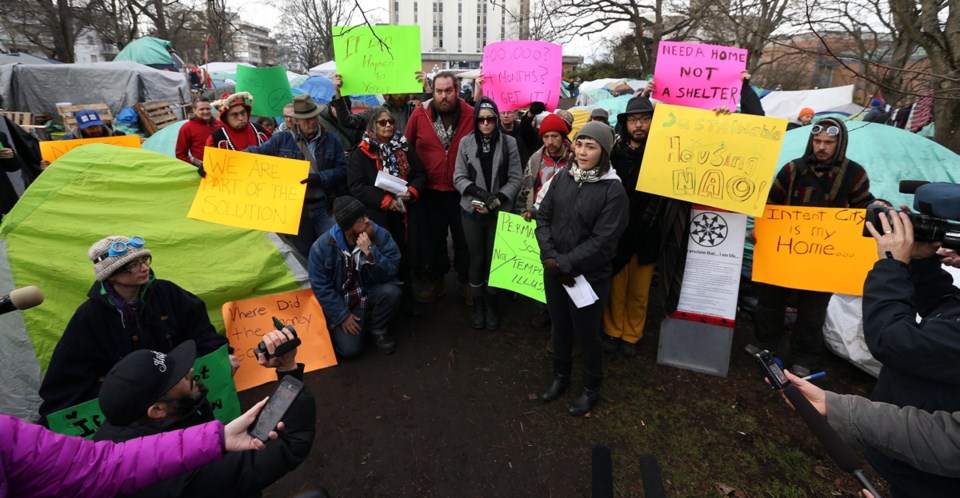They want homes and they want them on their own terms, members of Victoria’s 80-person courthouse tent community said on Monday.
Speaking to reporters, various campers took turns holding a carved “talking stick” to say temporary shelters are not an alternative to the encampment residents now call “Super InTent City.” Government initiatives too often ignore individuals, their specific needs and fail to take account of their strengths.
“We want to say ‘Not one size fits all,’ ” said Ashley Mollinson, a tent-city sympathizer and organizer of the news conference. “The provincial government needs to come and work with members of the tent city to find lasting, sustainable and meaningful solutions to end the housing crisis in Victoria.”
The campers were speaking in response to a letter distributed Friday by the provincial government asking them to move, “make arrangements for alternative shelter.”
“The province appreciates the complex issues facing campers at the site,” said the letter. But “the growing number of campers over the past month has created an increasing number of health and safety concerns making the courthouse property not a viable location for campers.”
Meanwhile, the 40 spots in a four-month, temporary shelter opened in the Boys and Girls Club, 1240 Yates St. are now occupied by 27 people. Our Place, the group operating the new shelter, is filling it gradually so occupants can adjust.
The province provided $400,000 last month to open the shelter until April, part of $600,000 spent for shelters and beds in Victoria.
The encampment at the Victoria courthouse began late last summer, with one or two tents. But over the coming months it filled with more than 100 campers, to the horror of nearby residents who complained of disturbances and petty crime.
Also, by last month, one person in the tent city had died from a drug overdose and one had been injured in a stabbing, during an argument.
But it appeared tenters had discovered a loophole in Victoria bylaws that made police and bylaw officers powerless to ask them to take down their tents.
The courthouse site, 850 Burdett Ave., is owned by the province and unless the owner, the province, makes an official complaint, police have no authority.
Usually, when people erect tents in city-owned parks, the municipal bylaw insists they dismantle their campsite by 7 a.m. and forbids them from re-erecting it before 7 p.m. City police and bylaw officers patrol the parks and roust people in the morning and tell them to move along.
At the courthouse, the camp and the tents stay put all day and all night.
Neighbourhood churches, notably the nearby Anglican Christ Church Cathedral and the Salvation Army, have been providing food and other assistance.
Kelly Newhook, of the Together Against Poverty Society, said her group has already lined up legal help to battle in court if the provincial government begins efforts to move the tenters.
“But we hope it doesn’t come to that,” she said.
Rev. Al Tysick, a founder of Our Place who now preaches and administers to people on the streets of Victoria, called upon all faith groups to help resist any legal move by the province to shift the campers.
“If there is a [court] injunction, we are calling on all religious communities to come and camp with us,” said Tysick.
He counselled the province to show patience and begin a long talk to find many solutions.
Tysick said the tent city had become a family and deserved some credit for that.
“At times, it’s a dysfunctional family,” he said. “Like any family, there are issues here.”
“But there is also love here and caring,” said Tysick.



